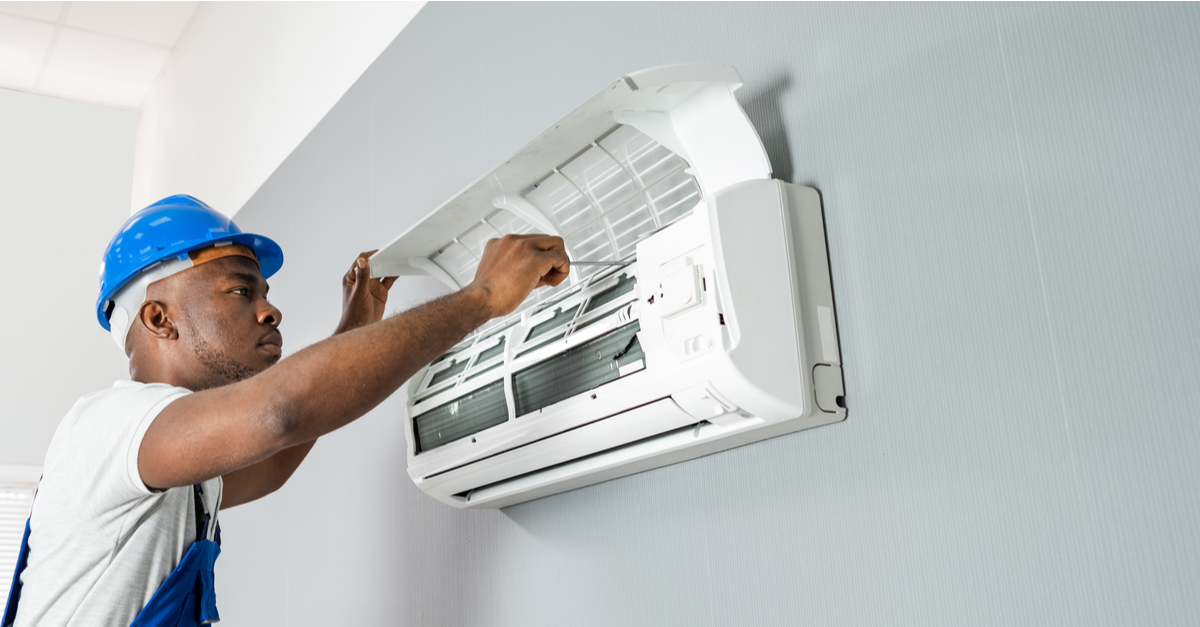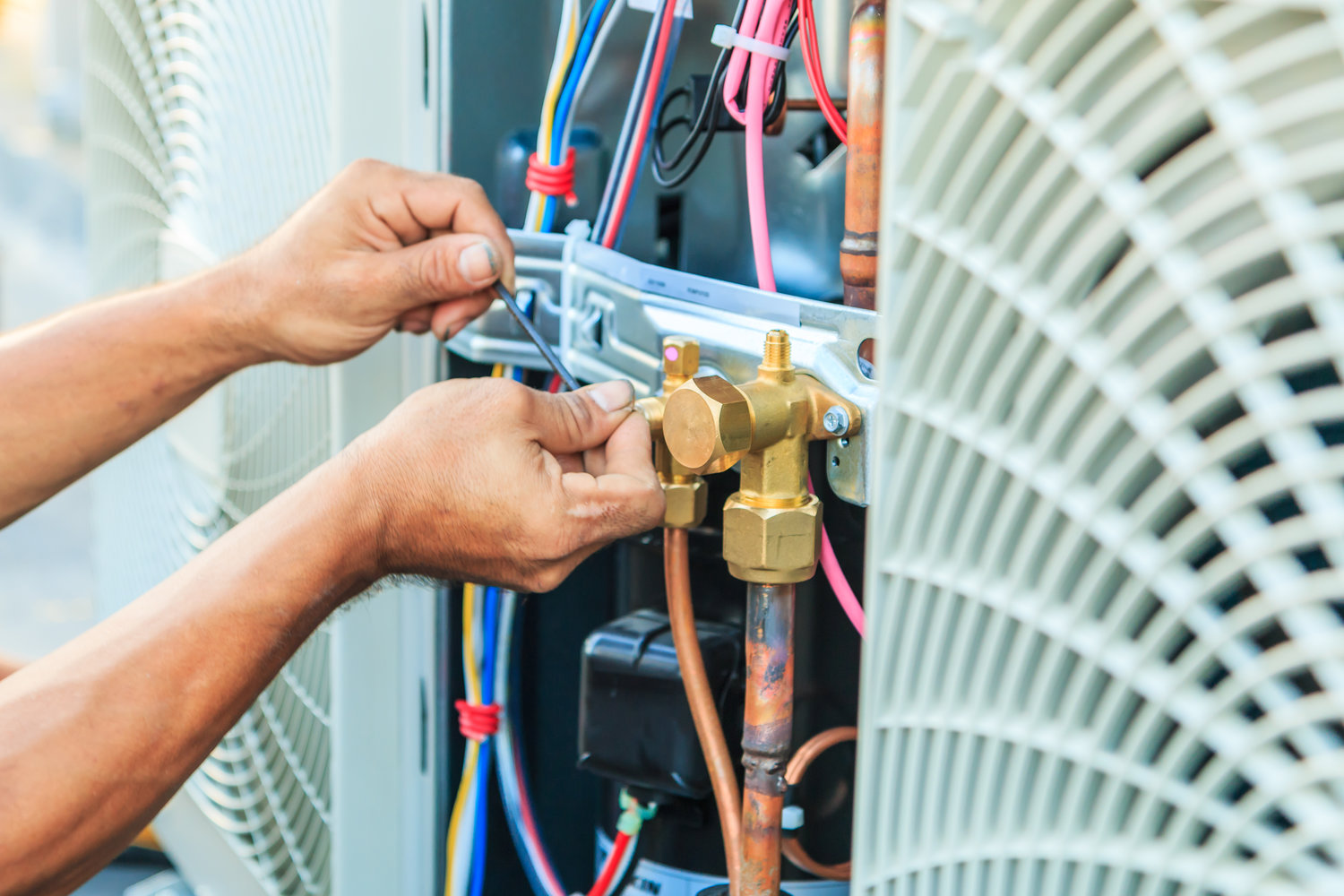Envision your air conditioning system as a master sculptor, skillfully chiseling away at the oppressive heat in your home, leaving an amazing, comfortable sanctuary. Have you ever before asked yourself just how this modern marvel attains such a feat?
The intricate dance of cooling agents, coils, compressors, and ducts all work in harmony to develop that invigorating blast of cold air. However just how precisely do these components integrated to produce that much-needed respite from the blistering heat?
Allow's reveal the internal functions of a/c unit and debunk the scientific research behind staying cool.
Key Takeaways
- Effective A/cs make use of cooling agents to absorb and release warmth, boosting air conditioning and power efficiency.
- Normal maintenance ensures optimal efficiency, durability, and power financial savings.
- Appropriate sizing and design avoid power waste and make certain also cooling circulation.
- Recognizing airflow dynamics and optimization improves cooling down effectiveness and convenience levels.

The Basics of A/c
Understanding the principles of cooling can greatly boost your expertise of exactly how these systems run effectively. Energy effectiveness is a vital aspect of a/c, as it not only impacts your electrical energy bill however additionally the atmosphere. Reliable air conditioning system use much less energy to cool an area, making them cost-efficient and green. By purchasing an energy-efficient unit, you can enjoy a comfy indoor setting while minimizing your carbon footprint.
Humidity control is another essential function of cooling. Air conditioning system aid control the dampness degrees in your house, creating a much more comfortable atmosphere. Excess humidity can bring about mold and mildew growth and pain, while reduced moisture degrees can create dry skin and respiratory problems. A well-maintained air conditioner can properly manage moisture, making sure a healthy and pleasurable living environment for you and your family.
Comprehending how a/c systems take care of power effectiveness and humidity control can aid you make informed choices when choosing and utilizing these systems in your house.
Comprehending Refrigerants and Their Function
When it involves a/c unit, recognizing cooling agents and their function is essential. You'll find out about the relevance of refrigerants in cooling down systems and how they assist in the heat transfer process.
In addition, thinking about the environmental effect of refrigerants is necessary for lasting air conditioning solutions.
Duty of Refrigerants
Cooling agents play a crucial role in the procedure of a/c unit by helping with the transfer of heat. The performance of a cooling agent straight impacts the cooling procedure and energy intake of the system.
When taking into consideration refrigerants, it's critical to weigh their effectiveness versus their ecological implications. Some cooling agents contribute to ozone deficiency and global warming, motivating the search for greener options. Lasting measures concentrate on finding refrigerant alternatives that are energy-efficient and have minimal ecological influence.
Suppliers are increasingly investing in creating new cooling agents that straighten with sustainability goals. By focusing on cooling agent performance and discovering sustainable alternatives, the cooling market intends to reduce its carbon impact and minimize environmental damage.
Ecological Impact Factors To Consider
Taking into consideration the environmental impact of cooling agents is essential in assessing the sustainability of a/c systems. When assessing the ecological effects of a/c, two essential aspects to take into consideration are energy effectiveness requirements and carbon footprint evaluation.
- Power Efficiency Specifications:
- Energy-efficient a/c unit take in much less electrical energy, reducing total power usage and ecological influence.
- Carbon Impact Evaluation:
- Carrying out a carbon impact evaluation helps in recognizing the quantity of greenhouse gas discharges associated with a/c operations. ac not blowing cold air
- Cooling agent Choice:
- Going with refrigerants with reduced Worldwide Warming Possible (GWP) can significantly reduce the environmental impact.
- Appropriate Disposal:
- Making sure appropriate disposal of old refrigerants avoids them from damaging the environment.
- Routine Maintenance:
- Normal maintenance of air conditioning systems can enhance efficiency, decreasing energy usage and ecological influence.
The Refine of Warm Transfer
When your a/c unit runs, it depends on a process of warm transfer to cool your area efficiently. This device involves the absorption of warmth from the interior air and the exchange of thermal power to preserve a comfortable temperature level.
Comprehending this crucial element assists you grasp how ac unit effectively regulate the climate in your house.
Warmth Absorption System
To effectively cool down the air in your space, a/c unit employ a warm absorption system that successfully transfers heat. This device plays a critical role in maintaining temperature law and making use of advanced air conditioning innovation.
Here's exactly how the warm absorption process works:
- Cooling agent Circulation: The refrigerant absorbs heat from the interior air.
- Compression: The compressor increases the stress of the refrigerant, creating its temperature to climb.

- Condensation: The hot, pressurized refrigerant launches warm outside as it condenses right into a fluid.
- Expansion Valve: This component decreases the refrigerant stress, creating it to cool and evaporate.
- Evaporation: As the refrigerant evaporates, it soaks up warmth from the indoor air, beginning the cycle anew.
Thermal Energy Exchange
In the process of thermal energy exchange, heat transfer plays an important function in how ac unit function to cool interior areas efficiently. Thermal characteristics dictate that warm constantly flows from a warmer area to a cooler one. A/c unit leverage this principle by extracting warmth from interior air and launching it outside, making use of cooling agents to assist in the transfer.
Effective thermal energy exchange is vital for the power effectiveness of an a/c system. By optimizing warmth transfer processes, air conditioning unit can cool areas effectively while minimizing energy intake. Understanding the characteristics of warmth transfer is essential for making and running air conditioning system that supply the preferred degree of convenience without unnecessary power wastefulness.
Evaporator Coils and Their Function
Comprehending the feature of evaporator coils is essential to realizing just how air conditioners effectively cool down indoor rooms. These coils play a vital function in the cooling procedure by soaking up warmth from the indoor air, which is then distributed back as great air.
Below are some key points about evaporator coils:
- Evaporator coil effectiveness straight affects the cooling efficiency of the a/c.
- These coils include refrigerant that evaporates as it absorbs warmth from the indoor air.
- As the cooling agent vaporizes, it transforms from a liquid state to a gas, cooling down the air at the same time.
- The cooled down air is after that dispersed throughout the area using the duct.
- Proper upkeep of the evaporator coils, such as normal cleaning, is necessary to ensure leading efficiency and energy effectiveness.
Compressor and Condenser Operations
Successfully cooling down indoor areas includes recognizing how the compressor and condenser collaborate in an air conditioning system. The compressor plays a crucial function in the cooling process by pressurizing the cooling agent gas, raising its temperature and energy level. This high-energy gas after that streams to the condenser, where it releases heat to the surrounding atmosphere, triggering it to condense right into a high-pressure fluid.
The condenser even more cools this liquid via heat exchange with the outside air, converting it back right into a low-pressure gas. This procedure enhances power performance and increases the system's cooling power. Temperature level regulation is achieved as the refrigerant cycles with these system elements, taking in heat inside and launching it outdoors.
Air Ducts and Air Distribution
To maximize air flow and assurance consistent air conditioning throughout your room, correct setup and upkeep of duct are important. Making certain that your air ducts are made effectively and in a way that promotes optimal airflow characteristics is vital for the general efficiency of your a/c system. Air flow approaches play a significant role in preserving indoor comfort levels, so it is necessary to take note of the following:
- Air duct Design: Properly developed duct help make sure that great air gets to every corner of your room efficiently.
- Air flow Characteristics: Comprehending how air moves via the ducts can aid you recognize any type of possible concerns that might interrupt the cooling process.
- Normal Maintenance: Maintaining your air ducts tidy and free of obstructions is essential for keeping air flow and system efficiency.
- Securing Leakages: Making sure that there are no leakages in your ductwork assists stop trendy air from running away, enhancing energy effectiveness.
- Balancing Air movement: Properly stabilizing the air flow in various areas can help maintain consistent air conditioning throughout your home or office.
Often Asked Concerns
Exactly how Does the Size of an Air Conditioning Unit Affect Its Efficiency and Cooling Ability?
When selecting an air conditioner, remember that size issues. A system that's too little might battle to cool your room effectively, while an extra-large one may lose energy and not evaporate effectively. Guaranteeing appropriate sizing considerations will improve effectiveness and cooling capability.
The ideal dimension straight influences performance, helping you stay comfortable without unnecessary expenses. So, when it involves ac system, remember dimension for ideal performance and cooling power.
What Are Some Common Upkeep Jobs That Can Help Boost the Life-span of an Air Conditioning Unit?
Routine upkeep tasks can substantially expand the life of your air conditioning unit. Bear in mind to change filters to ensure correct airflow and tidy coils to enhance cooling down effectiveness.
Additionally, calibrate your thermostat for accurate temperature analyses and examine the cooling agent levels for finest efficiency.
Can Air Conditioners Be Used together with Various Other Cooling Approaches, Such as Followers or Dehumidifiers?
Yes, you can enhance your air conditioning experience by integrating your ac system with followers. This collaboration can aid distribute awesome air more effectively, offering a more comfy environment and possibly saving energy.
Additionally, making use of a dehumidifier alongside your ac system can boost cooling efficiency by reducing moisture levels, making your area feel cooler.
Take into consideration these choices to enhance your cooling configuration and enhance your general comfort throughout hot days.
Exist Any Type Of Ecological Concerns Related To using Air Conditioners, and Just How Can They Be Mitigated?
When utilizing air conditioning unit, bear in mind ecological issues like energy consumption and greenhouse gas emissions.
To minimize these issues, take into consideration lasting air conditioning techniques and environmentally friendly alternatives.
You can decrease the effect of a/c by using energy-efficient designs, maintaining them frequently, and including various other cooling methods like fans or dehumidifiers.

What Innovations Are Being Made in Cooling Modern Technology to Make Systems More Energy-Efficient and Environmentally Friendly?
To make a/c unit much more energy-efficient and eco-friendly, advancements like clever innovation and environment-friendly features are being created. These advancements focus on boosting energy cost savings and lowering environmental influence.
By incorporating smart technology, a/c systems can maximize performance based upon use patterns. Using environment-friendly products and parts also contributes to making these systems extra lasting.
These developments aim to boost efficiency while lessening the eco-friendly impact of a/c technology.
Conclusion
So, now you recognize how ac system function!
From the refrigerants flowing with the system to the heat transfer process, each element plays an essential role in maintaining you cool.
The evaporator coils soak up warm, the compressor and condenser launch it, and the air ducts disperse the cool air throughout your area.
Following time you activate your air conditioning, keep in mind the science behind everything! Remain trendy!
